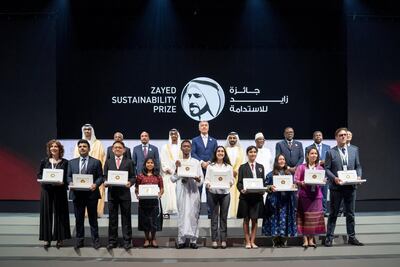Water should be made more expensive to teach the public it is not a “gift from the sky” and some hotels and malls should do more to preserve scarce resources, experts have said.
The issue of water, and how it is used in the UAE, came under the spotlight during an Abu Dhabi Sustainability Week conference on Monday. The country faces challenges in maintaining a water supply due to its climate and other issues, including high demand and waste.
It was also suggested that new regulations, which could involve the compulsory retro-fitting of buildings to make them more water efficient, could be rolled out more widely across the country.
Frederic Claux, head of GCC countries and Pakistan at Engie, a global energy and services group, said an overhaul of water prices for consumers should be on the table as cities across the world struggle to manage supplies.
“People tend to forget that there is a cost behind water,” he said. “Water is seen as a gift from the sky but in reality, when you look at the infrastructure you need to bring water to your tap, then it is a cost and people need to understand that. So it goes through a cost-effective tariff that incentivises people to save water or have reasonable use.”
Faisal Rashid, a director at the Dubai Supreme Council of Energy, said rolling out an integrated approach by managing water from all sources had proved successful.
Currently, desalinated water accounts for two thirds of that used in Dubai. Treated waste water, used mainly in irrigation, makes up around a quarter and a small amount of groundwater is used in farming. Dubai is attempting to increase the use of treated water to drive down dependence of expensive desalinated water.
However, Mr Rashid said that while regulation had been successful, there is scope to do more. A possible solution to provide water security in the UAE could even involve holding emergency strategic reserves at household level, he said.

“Waste and using excessive water in some areas, whether it is in a shopping mall, hotel or commercial position — this is an area we can work on,” he said. “Awareness can play only maybe 5 per cent of a role in terms of reduction. The key for government is to come up with policies.
“In Dubai, we have already finished more than 3,000 buildings with water as well as electricity devices.
“We have already introduced a good number of regulations … such initiatives move us forward but there is still opportunity to do more in regulation.”
Fatima Al Foora Al Shamsi, assistant undersecretary for electricity, water and future energy affairs, said a strategy is in place to address the long-term challenges of water security in the UAE, which include water scarcity and high demand. The plan, which it is hoped will be fully implemented by 2036, means a move away from “business as usual”, she said.
She added that the UAE is successfully moving away from thermal desalination of seawater, which is costly both financially and environmentally, to what is known as membrane desalination.
The thermal technique sees water evaporated and then condensed as a way to purify it. Under the membrane technique, water is pushed through a semi-permeable membrane under pressure to remove impurities.
Currently, the membrane method is used in 14 per cent of desalinated water, but it is planned this will increase to 54 per cent by 2036. Meanwhile, new regulations and policies are being developed for treated waste water, which should be finished by the end of this year.
“The water security strategy brings significant performance to the performance of the UAE water system.
"I look forward to the positive change and towards a brighter and more efficient future for the water system," said Ms Al Shamsi.

